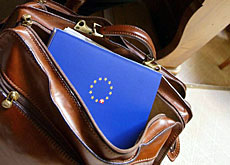Switzerland and the EU

Outside
Switzerland is not a member of the European Union. If and when a majority of Swiss become convinced that the EU is there to stay, the chances for membership will rise.
In 1992 Swiss voters narrowly turned down the European Economic Area (EEA) or single market. The three other members of the European Free Trade Agreement (Efta) – Iceland, Liechtenstein and Norway – did choose to join the EEA, although Efta still exists.
Joining the EU remains the cabinet’s stated option. A Swiss application for membership has been lodged in Brussels but remains dormant.
Under the Swiss system of direct democracy, an actual application to join the EU would entail a national referendum, and a majority of voters and cantons in favour of joining.
The lukewarm attitude to the EU is based on a number of factors. The union is perceived as falling short in democratic institutions. Switzerland’s frequently used system of initiatives and referenda would need drastic reform and curtailment to comply with EU rules.
There is also a concern about the cost: Switzerland would be a net contributor to the EU coffers, and there are doubts about whether neutrality would be compatible with EU membership.
Trade
Swiss trade and industry is not convinced of the benefits of EU membership. Switzerland has traditionally traded with the whole world, with every second franc being earned through exports.
General Swiss scepticism about the EU was underlined by a national vote in 2001, which turned down a proposal on opening membership negotiations.
The pragmatic response of the Swiss government since 1992 has been to engage in long and difficult talks with the EU on a series of bilateral accords.
A first set of bilateral treaties between Switzerland and the EU, mainly on trade, labour and transport issues, came into force in 2002.
A second series of treaties, signed in October 2004, has been approved by parliament and the people.
The rightwing Swiss People’s Party challenged the Schengen/Dublin accords on closer security cooperation to a nationwide vote. But the electorate approved the treaties at the ballot box in June 2005.
A separate vote, on whether to extend an existing labour accord to include the ten new EU member states, was approved by voters in September 2005.
Despite a campaign led by the far-right Swiss Democrats and parts of the far left, voters accepted the extension of the treaty.
In February 2009 the electorate approved the continuation of a key labour accord and its extension to the latest EU members, Bulgaria and Romania.
To ensure Switzerland does not suffer discrimination as a non-member, Swiss legislation in many fields, including trade, has been brought into line with that of the EU.
But the clearest indication of how matters are on hold is that EU membership no longer figures as a government goal – membership is now termed “an option”.

In compliance with the JTI standards
More: SWI swissinfo.ch certified by the Journalism Trust Initiative









You can find an overview of ongoing debates with our journalists here . Please join us!
If you want to start a conversation about a topic raised in this article or want to report factual errors, email us at english@swissinfo.ch.